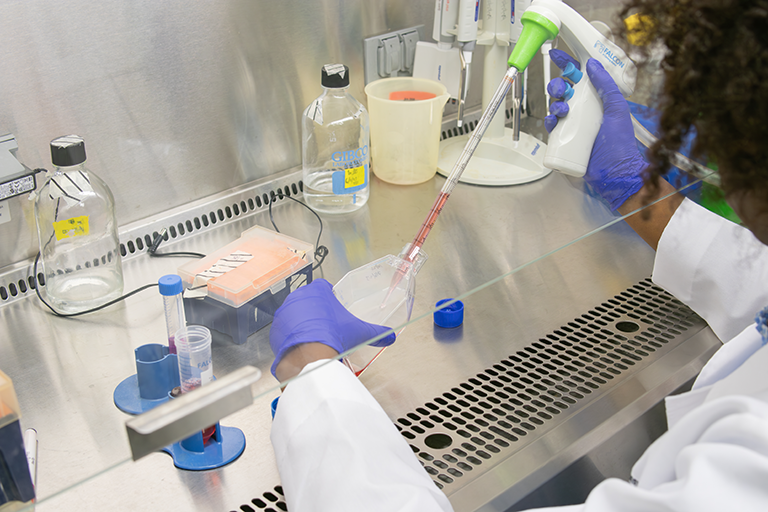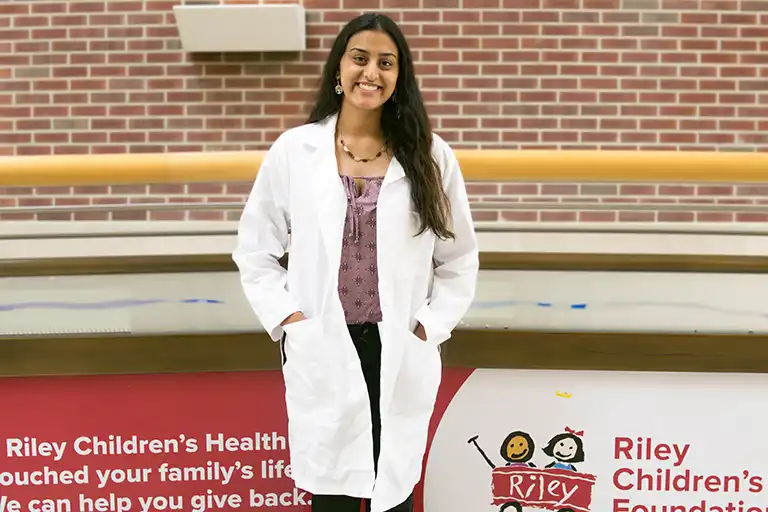Educational Pathways for Cancer Research (EPCR) provides cancer research pathways for students interested in medicine and cancer-related fields. With experiences for undergraduate students and high school teachers, EPCR aims to increase the number of highly skilled workers in the biomedical workforce.
Research opportunities for students and teachers
Applications are now open and will close Jan. 31, 2026.
Apply NowFor students (in-person 10 weeks per year; two-year commitment)
Students will participate in 10 weeks of mentored laboratory research experience. Participating students will have the opportunity to make ongoing connections to the cancer center.
For high school teachers (in-person four weeks)
EPCR Teacher Training Program provides Indiana high school teachers with integrated laboratory research experience and curriculum development opportunities to enhance their biology and cancer-related teaching skills and to create excitement for their students for science-related careers. The program is offered at Indiana University Indianapolis in partnership with the Indiana University Bloomington School of Education.
High school science teachers will participate in four weeks of laboratory research experience and curriculum development activities that integrate cancer-related topics into the state curriculum. Participating teachers will have the opportunity to make ongoing connections to the cancer center and their schools throughout the year through field trips and school trips.
EPCR for graduating high school seniors and undergraduate students
The EPCR summer program provides mentored, high-quality, cancer-focused research experiences for graduating high school seniors and undergraduate students. Students from medically underserved populations are encouraged to apply.
Participants will develop skills to think analytically and critically; design, perform and troubleshoot experiments; interpret research data; formulate new ideas; and propose meaningful strategies for testing those ideas through experiments with guidance from mentors.
- Interact with one of the cancer center research programs, shared facilities, and more than 100 world-renowned investigators
- Gain exposure to a wide range of basic science, translational, and clinical research activities
- Continually interact with and learn from other students, clinical and post-doctoral fellows, and faculty
- Networking events
- Receive a stipend (payment)

How EPCR works for students
Participants are paired with a research mentor. Research projects may involve laboratory-based research, computer-based database research or clinical research.
Students learn about research methodology and will complete a project over the summer months. They will present their findings at poster and oral presentation sessions.
Applicants are expected to actively participate in all aspects of the program, including professional development. During the 10-week program (May 19-July 25, 2025), participants work 40 hours each week. Full-time attendance is mandatory throughout the program’s duration.
Who should apply?
EPCR is designed to serve students interested in biomedical and clinical research. Students from medically underserved communities are encouraged to apply.
It is open to graduating high school seniors entering their freshman year and undergraduate university students who have not yet completed their degree by Fall 2024.
Although most past participants have resided in the metropolitan Indianapolis area, the program accepts applications from students across the United States.
All federally funded programs require candidates to be U.S. citizens or green card holders.
How do I apply?
Please read all of the instructions carefully to ensure accurate completion and correct processing of this application.
Academic Transcripts: Your application will require you to upload school transcripts. Please prepare by downloading them from your school or requesting a copy from your school’s administration.
Personal Statement: Please prepare a document in which you describe why you are interested in participating in EPCR. You will upload it to the application.
Recommendation Letter: All applicants must provide one (1) letter of recommendation. When you complete the General Information part of the application, you will receive a link to provide an email address for the individual who will be writing your letter of recommendation. This individual will then be automatically notified of your request. We strongly suggest that you speak with your recommender beforehand and get their approval before you provide their email on your application link.
Housing and Transportation
The cancer center provides housing support to a portion of accepted students based on need, but slots are limited. Housing is a shared apartment-style unit with full appliances. Applicants from outside central Indiana who do not receive and/or need housing support have the option to stay with family or friends who live within 40 miles of the IU Indianapolis campus. IU housing policy does not allow participants under the age of 18 (at time of program start) to stay in campus housing.
Learn about the EPCR experience

Questions?
Contact the Research Outreach Team at SimonEdu@iu.edu.




